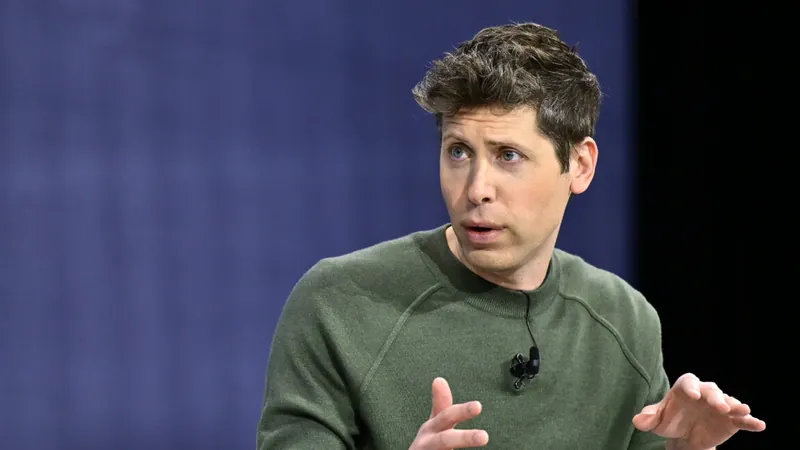
Sam Altman Declares Breakthrough in AGI Development: Are We on the Brink of an AI Revolution?
2025-01-06
Author: Sophie
Introduction
In a bold and controversial move, OpenAI CEO Sam Altman took to his personal blog on Sunday, claiming, 'We are now confident we know how to build AGI as we have traditionally understood it.' Altman’s statements have stirred the tech community, particularly as he forecasts that by 2025, AI agents may begin integrating into the workforce, potentially revolutionizing corporate productivity.
The Significance of Altman's Statement
As the leader of OpenAI amidst the surge of generative AI technologies, including the ever-popular ChatGPT, Altman’s assertion carries significant weight. AI agents, which are gaining traction in the industry, are designed to perform tasks autonomously, essentially representing a user's interests without direct input. However, his predictions did not go unnoticed by critics. Gary Marcus, a well-known skeptic of OpenAI, responded with acerbic commentary, implying that such proclamations are just marketing hyperbole aimed at securing funding rather than substantial advancements.
Understanding AGI
AGI, or artificial general intelligence, is often described as a level of AI that can surpass human capabilities in various tasks. OpenAI typically frames AGI as 'highly autonomous systems that outperform humans at economically valuable work.' The vision of AGI has intrigued investors and tech enthusiasts alike, but the reality remains complex; achieving such intelligence means creating systems that can generalize knowledge beyond their training data.
Financial Implications
Intriguingly, a recent financial agreement with Microsoft stipulates that OpenAI will consider AGI achieved only when its AI models collectively generate a staggering $100 billion in profits. This raises questions about the tangible financial implications of AGI and its potential to replace human jobs, particularly in sectors like information technology, posing societal challenges that are yet to be addressed.
Criticism from Experts
Criticism of Altman’s predictions of imminent AGI is widespread. Marcus, who frequently serves as a counterbalance to Altman, detailed in a series of social media posts the shortcomings of current language models, emphasizing their struggles with basic arithmetic, logical reasoning, and accuracy in unfamiliar contexts. For instance, OpenAI's latest model, o1-pro, although capable of performing some scientific tasks, has reportedly underperformed on benchmarks compared to competitors.
The Future of Superintelligence
Despite criticisms, Altman remains confident in future advancements. He hinted at an ambitious longer-term goal: the development of superintelligence. This concept refers to advanced AI systems that could surpass human cognitive abilities significantly, paving the way for unprecedented innovations in science and technology. He envisions a future where superintelligent tools would enhance our ability to tackle complex problems and push the boundaries of discovery.
Broader Ethical Discussions
Altman’s reflections also spark broader discussions around the role of AI in society. As the technology continues to evolve, ethical considerations such as the potential for job displacement and the necessity for mechanisms like universal basic income are becoming more pressing. The vast implications of AI on employment, economics, and social norms can hardly be overstated.
Conclusion
In conclusion, while Altman’s optimistic predictions paint a picture of a near-future dominated by AGI and superintelligence, the skepticism from experts highlights the challenges and uncertainties that lie ahead. Whether OpenAI can live up to these lofty goals remains to be seen, but one thing is clear: the conversation around AI's potential and its impact on humanity is just beginning. Stay tuned, as the unfolding narrative of AI developments promises to bring both excitement and concern for the future.



 Brasil (PT)
Brasil (PT)
 Canada (EN)
Canada (EN)
 Chile (ES)
Chile (ES)
 Česko (CS)
Česko (CS)
 대한민국 (KO)
대한민국 (KO)
 España (ES)
España (ES)
 France (FR)
France (FR)
 Hong Kong (EN)
Hong Kong (EN)
 Italia (IT)
Italia (IT)
 日本 (JA)
日本 (JA)
 Magyarország (HU)
Magyarország (HU)
 Norge (NO)
Norge (NO)
 Polska (PL)
Polska (PL)
 Schweiz (DE)
Schweiz (DE)
 Singapore (EN)
Singapore (EN)
 Sverige (SV)
Sverige (SV)
 Suomi (FI)
Suomi (FI)
 Türkiye (TR)
Türkiye (TR)
 الإمارات العربية المتحدة (AR)
الإمارات العربية المتحدة (AR)